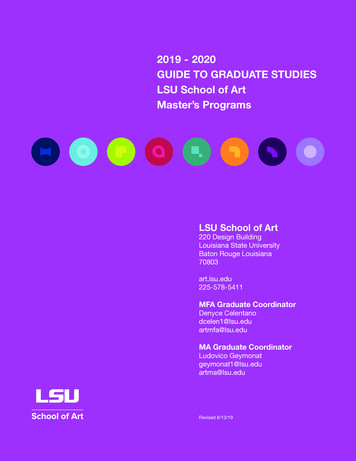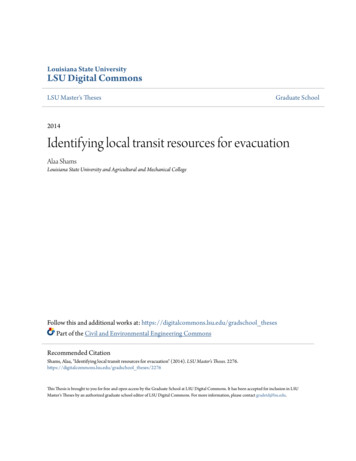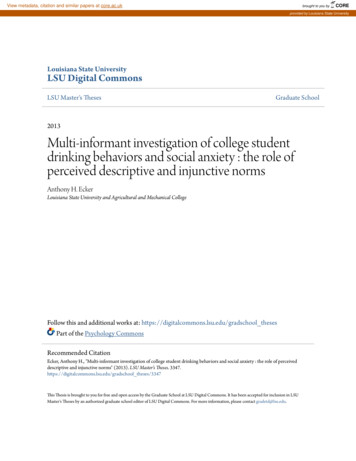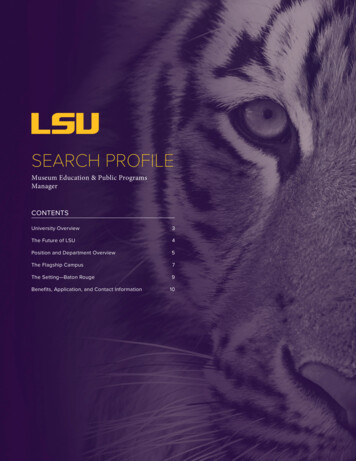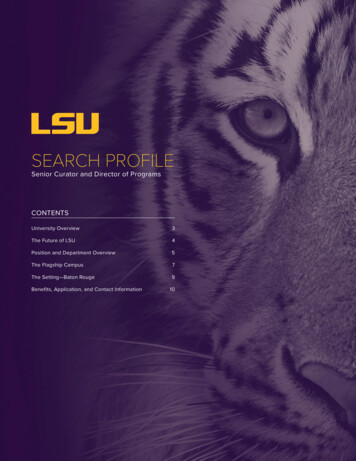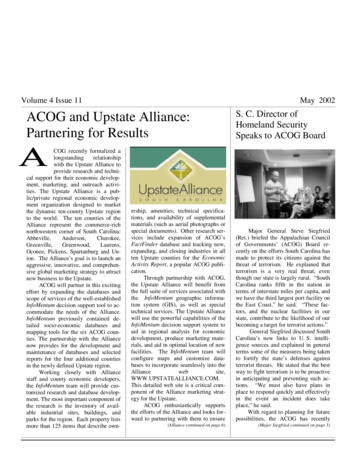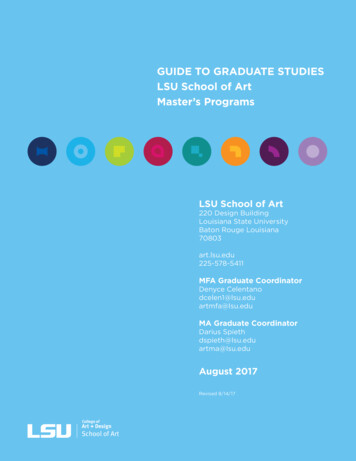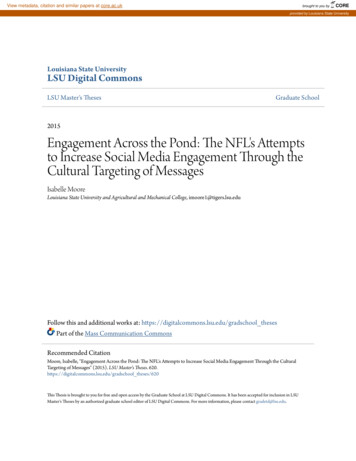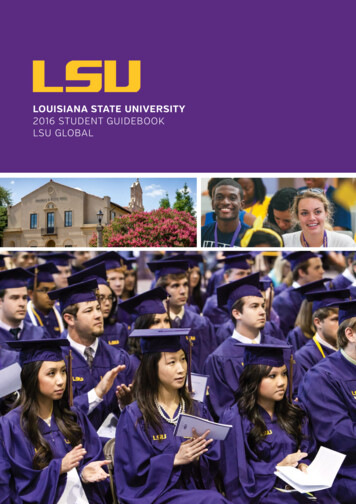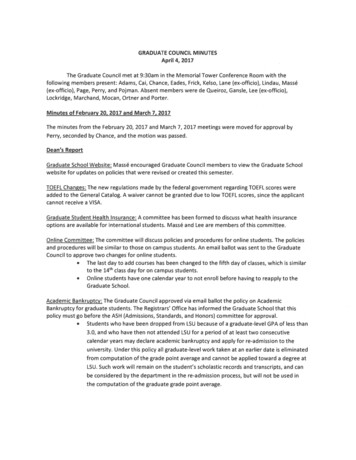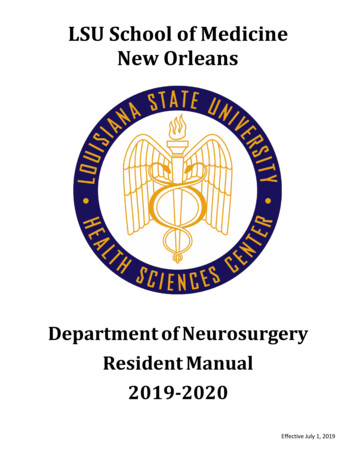
Transcription
LSU School of MedicineNew OrleansDepartment of NeurosurgeryResident Manual2019-2020Effective July 1, 2019
LSUHSC SCHOOL OF MEDICINEDEPARTMENT OF NEUROSURGERYRESIDENT MANUAL 2019-2020TABLE OF CONTENTSINTRODUCTION AND OVERVIEW .5PROGRAM OVERALL GOALS, OBJECTIVES, AND GRADUATION REQUIREMENTS.6NEUROSURGERY DEPARTMENT POLICIES .6HOUSE OFFICER ELIGIBILITY AND SELECTION . 6RESIDENT EVALUATION AND PROMOTION POLICY . 7RESIDENT DISMISSAL POLICY .8PRELIMINARY INTERVENTION . 8PROBATION . 8CONDITIONS FOR REAPPOINTMENT . 8TERMINATION, NON-REAPPOINTMENT, AND OTHER ADVERSE ACTION . 9DUE PROCESS . 9SUMMARY SUSPENSIONS . 11OTHER GRIEVANCE PROCEDURES . 12OMBUDSMAN . 12SEXUAL HARASSMENT POLICY . 12STATEMENT ON PROFESSIONALISM . 13INSTITUTIONAL POLICY ON CLINICAL AND EDUCATIONAL WORK HOURS. ERROR! BOOKMARK NOT DEFINED.CAMPUS ASSISTANCE PROGRAM (CAP) . 16INSTITUTION/HOUSE OFFICER CLOSURE/REDUCTION POLICY . 17POLICY ON HOLIDAY SCHEDULE . 17MOONLIGHTING POLICY . 17HURRICANE POLICY AND CALL FOR EVACUATION . 17STATEMENT ON OVERSIGHT AND LIAISON . 18ADMINISTRATIVE INFORMATION . 18VACATIONS . 18MILITARY LEAVE . 19LEAVE OF ABSENCE . 19MATERNITY/PATERNITY LEAVE . 19EDUCATIONAL LEAVE . 19FAMILY LEAVE . 19SICK LEAVE . 19MEETINGS . 192
TRAVEL . 20ROTATIONS . 20SURGICAL HOUSESTAFF ASSIGNED TO NEUROSURGERY SERVICE . 20CALL SCHEDULES . 21MEALS . 21PAGERS . 21PAYROLL. 21INSURANCE COVERAGE. 21COMPUTERS AND LIBRARIES . 21MEDICAL LICENSURE . 22TEXTBOOKS . 22LAB COATS . 22LEAD APRON AND THYROID SHIELDS . 22SURGICAL LOUPES . 23I-PADS . 23AMERICAN BOARD OF NEUROLOGICAL SURGERY PRIMARY EXAMINATION . 23MEDICAL RECORDS . 23ACGME CASE LOGS. 23NEUROSURGERY RRC DEFINED CATEGORIES AND MINIMAL REQUIREMENTS . 24DEPARTMENT OF NEUROSURGERY CONFERENCES . 25LOUISIANA ANNUAL NEUROSURGICAL SOCIETY (LANS) MEETING . 26DUTIES OF THE RESIDENTS IN EACH YEAR . 26PGY-1 – FIRST YEAR RESIDENT IN NEUROSURGERY . 27PGY-2 – SECOND YEAR RESIDENT IN NEUROSURGERY. 27PGY-3 – THIRD YEAR RESIDENT IN NEUROSURGERY . 29PGY-4 – FOURTH YEAR RESIDENT IN NEUROSURGERY. 31PGY-5 – FIFTH YEAR RESIDENT IN NEUROSURGERY . 32PGY-6 – SIXTH YEAR RESIDENT IN NEUROSURGERY . 34PGY-7 – SEVENTH YEAR RESIDENT IN NEUROSURGERY . 35LSU DEPARTMENT OF NEUROSURGERY SUPPORT STAFF . 362019-2020 ROTATION SCHEDULE.ERROR! BOOKMARK NOT DEFINED.373
LSU SCHOOL OF MEDICINE - NEW ORLEANSNEUROSURGERY RESIDENT MANUALIn the event a program or departmental policy or guideline conflicts with the LSU SOM NO House OfficerManual, the LSU SOM NO House Officer Manual takes precedence. (GME House Officer Manual)INTRODUCTION AND OVERVIEWThe mission of the clinical training program is excellence in patient care, scholarship, and neurosurgical education.Program goals have been established by which satisfaction of the mission is judged. Residents first establish foundationsin fundamental clinical and surgical skills. As training progresses, increasing clinical and scholarly neurosurgical expertiseis acquired. Upon completion of the neurosurgery residency, each graduate will be highly skilled in managing the fullspectrum of neurosurgical disease. Furthermore, all graduates will be educated in neurosurgical scholarship, promotingthe advancement of neurosurgical knowledge.The LSU Neurosurgical Residency is a 7-year (84 month) program. There are 60 months of clinical neurosurgery of whichthe last 12 months serve as chief residency. Three months of the PGY 1 year are spend on the General Surgery serviceestablishing the fundamental clinical skulls of the evaluation and management of the general surgical patient with anemphasis on trauma and clinical critical care. Another three months are spent in neurology learning to master theneurological examination and formulating a differential diagnosis in the neurological patient. Other service rotationsduring the PGY 1 year include West Jefferson Medical Center (WJMC) and University Medical Center (UMCNO) alongwith neuroscience rotations which include: 2-3 months of neuroradiology, endovascular, radiosurgery and 2 months ofneuropathology. The PGY-2 year is divided between UMCNO and WJMC as a junior resident. The PGY 3 through PGY 4year is divided between WJMC senior resident rotation, UMCNO Senior Resident and Pediatric Neurosurgery atChildren’s Hospital New Orleans (CHNOLA). The PGY 5 year is considered an academic/research year which can bespent at the LSU Neuroscience Center of Excellence or another approved academic experience. The department willsupport residents in the PGY 5 year to pursue a Master of Health Administration or (MHA) or a Master of BusinessAdministration (MBA) through LSU-Shreveport online. The PGY 6 and PGY 7 years are spent as the chief residents. Insummary, there are 12 months of intern and neuroscience rotations. 24 months of clinical junior residency, another 24months of clinical senior rotations, a year of research work, and a final 12 months of clinical neurosurgery serving aschief resident.Neuro-Critical Care experience is emphasized throughout the training, and extensive exposure to subspecialty servicesincluding Neurovascular, Neuro-Oncology, Epilepsy Surgery, Spinal Neurosurgery, Stereotactic Radiosurgery,Neurotrauma, Functional Neurosurgery, and Pediatric Neurosurgery.Didactic conferences are protected from all clinical commitments and include: morbidity and mortality (M & M)conference, case conference, subspecialty conferences, journal club, neuroradiology, neurology, and neuropathologyconferences. Our skull base lab is also utilized for a weekly approach (June - August) directed by the residents withfaculty guidance. In addition, preparation of scientific manuscripts, review articles, book chapters and abstracts, as wellas presentation skills and leadership/administrative skills are fostered within a structured mentored environment in amultidisciplinary fashion.4
PROGRAM OVERALL GOALS, OBJECTIVES, AND GRADUATION REQUIREMENTSThe overall goal of the residency program is to develop in our graduating residents a proficiency level appropriate for anew and independent practitioner in the six core competencies as outlined by the ACGME.1. Patient care that is compassionate, appropriate, and effective for the treatment of health problems and thepromotion of health.2. Medical knowledge about established and evolving biomedical, clinical, epidemiological and social-behavioralsciences, as well as the application of this knowledge to patient care.3. Practice-based learning to demonstrate the ability to investigate and evaluate their care of patients, to appraiseand assimilate scientific evidence, and to continuously improve their patient care based on constant selfevaluation and life-long learning.4. Interpersonal and communication skills that result in the effective exchange of information and collaborationwith patients, their families, and health professionals.5. Professionalism manifested through a commitment to carrying out professional responsibilities and anadherence to ethical principles.6. Systems-based practice as manifested by actions that demonstrate an awareness of and responsiveness to thelarger context and system of health care, as well as the ability to call effectively on other resources in the systemto provide optimal care.Each rotation is designed to contribute to the achievement of the overall goal and therefore share the common goal. Inorder to direct progress toward goal achievement, general and specific objectives are identified. General Objectives arepurposefully common to all rotations and listed separately. Unique aspects of each rotation are outlined and specificobjectives are listed under each rotation. In order to achieve our stated goal, we have purposefully mirrored the goalsand objectives of the ACGME Milestones Project. Our assessment tools are designed to demonstrate progress towardsthese objectives by direct linking via a common format.NEUROSURGERY DEPARTMENT POLICIESHOUSE OFFICER ELIGIBILITY AND SELECTIONHouse Officer Selection criteria must conform to the guidelines of the Accreditation Council for Graduate MedicalEducation (ACGME) General Requirements. House Officers are selected by program directors from an applicant pool inthe National Residency Matching Program (NRMP).United States Citizens, Permanent Residents of the US, and J1 Visa holders sponsored by the ECFMG are the onlyapplicants eligible for selection. As noted in the Chancellor Memorandum 39 (CM-39) ECFMG sponsorship as a J-1exchange visitor is the appropriate and only mechanism whereby foreign physicians may enter graduate medicaleducation/training programs at the LSU Health Sciences Center.House Officers must be (1) graduates of medical schools in the United States and Canada accredited by the LiaisonCommittee on Medical Education (LCME); (2) graduates of colleges of osteopathic medicine in the United Statesaccredited by the American Osteopathic Association (AOA); (3) graduates of medical schools outside the United Stateswho have received a currently valid certificate from the Education Commission for Foreign Medical Graduates or have afull and unrestricted license to practice medicine in a United States licensing jurisdiction; or (4) graduates of medicalschools outside the United States who have completed a Fifth Pathway Program by an LCME-accredited medical school.5
All acceptable candidates are invited to submit applications through the Electronic Resident Application System (ERAS).The department of Neurosurgery does not support any visas except for a J1. If a foreign medical graduate matches withour program, they must be registered and verified through the Educational Commission for Foreign Medical Graduates(ECFMG) before beginning their residency training. All applicants must also meet the requirements for licensure throughthe Louisiana State Board of Medical Examiners – either an intern permit, which will eventually lead to an unrestrictedlicense or a Graduate Education Training Permit (GETP) given to foreign medical graduates.All House Officer Trainees must have a valid active license or permit to practice medicine in the State of Louisiana, orDDS license in the case of Dental resident and pre-MD Oral Surgery residents. The Louisiana State Board of MedicalExaminers issues temporary training permits to qualified post-graduate year I level trainees. Temporary permits (Visitingresident permits) also may be issued for certain foreign medical graduates entering the US on J1 visas. Foreign citizentrainees must have standard Educational Commission for Foreign Medical Graduates (ECFMG) certification. Rules andregulations regarding trainees with visas frequently change. When questions regarding visas arise, the Neurosurgerydepartment will refer all questions to the LSUHSC Office of Governmental Relations for final determination to ensurecompliance with all institutional, state, and Federal rules and regulations.Requirements for medical licensure change from time to time. The Louisiana State Board of Medical Examiners (LSBMErequires passage of USMLE Step 3 before the end of PGY 2 year to issue a permit or license to begin PGY 3 training.Because of the wait times between sitting for the USMLE and the reporting time, residents not passing USMLE Step 3 byMarch 1 of their PGY 2 year are subject to automatic non-renewal of their contract to enter the PGY 3. The rules for howmany times the USMLE can be taken and the waiting times required between sitting for the test exchange. For thisreason, the House Officer is urged to regularly review these specific rules.The Coordinator, Program Director and other faculty then review the submitted applications. Criteria for an interviewoffer include but are not limited to performance on standardized tests, medial school performance, letters ofrecommendation (3), personal statement, extra-curricular activities, and research activities.Interviews take place in November, December, and January. Applicants are interviewed by the Residency InterviewCommittee (approximately 8-10 faculty and 2-3 chief residents) with interviews approximately 15 minutes long. Allapplicants will meet with the Program Director and Chairman.At the completion of the interview process, applicants will be ranked on the basis of the preceding factors incombination with a subjective evaluation of the interview by the faculty. Faculty, chief residents, program director, andthe chairman meet and based on the applicants interview and their advocates among faculty; final ranking list isprepared and then submitted to the National Resident Match Program (NRMP). If the program does not fill through theusual matching process, the position will be filled through the NRMP Supplemental Offer and Acceptance Program(SOAP). The most qualified individuals based on the above factors will be contacted for an interview. The position will beoffered based on a vote of the faculty members.RESIDENT EVALUATION AND PROMOTION POLICY –Records of House Officer Evaluations are to be maintained by the Departmental Program Director. These files willgenerally be available for review to the individual trainees, training faculty, Program Director, and other Universitypersonnel as may be required by the LSU House Officer program, School of Medicine, or University. House Officers arenot given partial or complete copies of their files. In the cases where an outside entity is requesting information directlyon a resident, upon receiving a valid release of information from our website, LSU will supply the requested information6
directly to the requesting institution. House Officers will be formally evaluated no less than twice a year. Both strengthsand weaknesses will be documented and discussed in the evaluation process, as well as plans to remediate anydeficiencies.There are several areas where a resident must demonstrate accomplishments and proficiency to advance to the nextlevel of training or be considered qualified to practice neurosurgery at the highest level. These are as follows:evaluations by faculty and students, proficiency in the 6 ACGME competencies, satisfying graduate medicalrequirements, satisfying ACGME Milestone requirements, successful completion of the written neurosurgical boardexams for the appropriate year of training, quality improvement research project involvement, and scholarly activity(presentations and manuscript preparation). The practice of an excellent standard of medical care in each area of the sixcompetencies is regularly evaluated through the biannual evaluation process as well as in regular clinical mentoring.Milestone evaluations are reported to the ACGME semi-annually. By participating with the American Board ofNeurological Surgery (ABNS) examinations, the Residency Review Committee for Neurological Surgery (RRC) and theAccreditation Council for Graduate Medical Education (ACGME) oversight, the residents are assessed compared tonational standards for neurosurgery. The LSU School of Medicine Office of Graduate Medical Education requirescompletion of Core Curriculum Modules with an 80% pass rate on each test for resident advancement to the next yearof training. Residents must pass USMLE Step 3 in order to advance to the PGY 3 level.RESIDENT DISMISSAL POLICYPRELIMINARY INTERVENTIONSubstandard disciplinary and/or academic performance is determined by the Department of Neurosurgery. Correctiveaction for minor academic deficiencies or disciplinary offenses which do not warrant remediation as defined below, shallbe determined and administered by the Neurosurgery Department. Corrective action may include oral or writtencounseling or any other action deemed appropriate by the Department under the circumstances. Corrective action forsuch minor deficiencies and/or offenses are not subject to appeal. If such circumstances should occur, the ClinicalCompetence Committee (CCC) will meet in order to determine the appropriate counseling.PROBATIONHouse Officers may be placed on probation for, among other things, issuance of a warning or reprimand; orimposition of a remedial program. Remediation refers to an attempt to correct deficiencies which, if leftuncorrected, may lead to a non‐reappointment or disciplinary action. In the event a House Officer’sperformance, at any time, is determined by the House Officer Program Director to require remediation, theHouse Officer Program Director shall notify the House Officer in writing of the need for remediation. Aremediation plan will be developed that outlines the terms of remediation and the length of the remediationprocess. Failure of the House Officer to comply with the remediation plan may result in termination, non‐renewal, non‐promotion, extension of the probationary period of the House Officer’s appointment, or acombination of the foregoing. In cases where probation is extended as part of non‐promotion, the appeal ofprobation, if any, would be included in the appeal, if any, of non‐promotion as described in the Due Processsection of the manual (revised June 2017).CONDITIONS FOR REAPPOINTMENTThe Department of Neurosurgery will provide notice in writing of the intent to non-renew or non-promote residents asearly as circumstances will allow.8
TERMINATION, NON-REAPPOINTMENT, AND OTHER ADVERSE ACTIONA House Officer may be dismissed or other adverse action may be taken for cause, including but not limited to:i.ii.iii.iv.v.vi.vii.viii.Unsatisfactory academic or clinical performance;Failure to comply with the policies, rules, and regulations of the House Officer program or University orother facilities where the House Officer is trained;Revocation, expiration or suspension of license;Violation of federal and/or state laws, regulations, or ordinances;Acts of moral turpitude;Insubordination;Conduct that is detrimental to patient care; andUnprofessional conduct.The House Officer Program may take any of the following adverse actions:i.ii.iii.iv.v.vi.vii.Issue a warning or reprimand;Impose terms of remediation or a requirement for additional training, consultation or treatment;Institute, continue, or modify an existing summary suspension of a House Officer’s appointment;Terminate, limit or suspend a House Officer’s appointment or privileges;Non-renewal of a House Officer’s appointment;Dismiss a House Officer from the House Officer Program;Any other action that the House Officer Program deems is appropriate under the circumstances.DUE PROCESSAll communication regarding due process will occur by either official campus email, certified letter, or hand delivery(revised 12/15/2009). Dismissals, non-reappointments, or non- promotion 25 are subject to appeal and the process shallproceed as follows:Recommendation for dismissal, non‐reappointment, non‐promotion or other adverse action which could significantlythreaten a House Officer’s intended career development shall be made by the Program Director in the form of a Requestfor Adverse Action. The Request for Adverse Action shall be in writing and shall include proposed disciplinary action, awritten statement of deficiencies and/or charges registered against the House Officer, a list of all known documentaryevidence, a list of all known witnesses and a brief statement of the nature of testimony expected to be given by eachwitness. The Request for Adverse Action shall be delivered in person to the Department Head. If the Department Headfinds that the charges registered against the House Officer appear to be supportable on their face, the Department Headshall give Notice to the House Officer in writing of the intent to initiate proceedings which might result in dismissal, non‐reappointment, summary suspension, or other adverse action. The Notice shall include the Request for Adverse Actionand shall be sent by campus email, certified mail to the address appearing in the records of the Human ResourceManagement, or may be hand delivered to the House Officer (revised 12/15/2009). Probation which is included as partof one of these appealable actions delineated above is appealed as part of this Due Process and not as a separate appealprocess (see Probation section revision June 2017) (revised June 2017).Upon receipt of Notice, the House Officer shall have five (5) working days to meet with the Department Head andpresent evidence in support of the House Officer’s challenge to the Request for Adverse Action. Following the meeting,the Department Head shall determine whether the proposed adverse action is warranted. The Department Head shall9
render a decision within five (5) working days of the conclusion of the meeting. The decision shall be sent by campusemail, certified mail to the address appearing in the
spent at the LSU Neuroscience Center of Excellence or another approved academic experience. The department will support residents in the PGY 5 year to pursue a Master of Health Administration or (MHA) or a Master of Business Administration (MBA) through LSU-Shreveport online. The PGY 6 and PGY 7 years are spent as the chief residents. In
